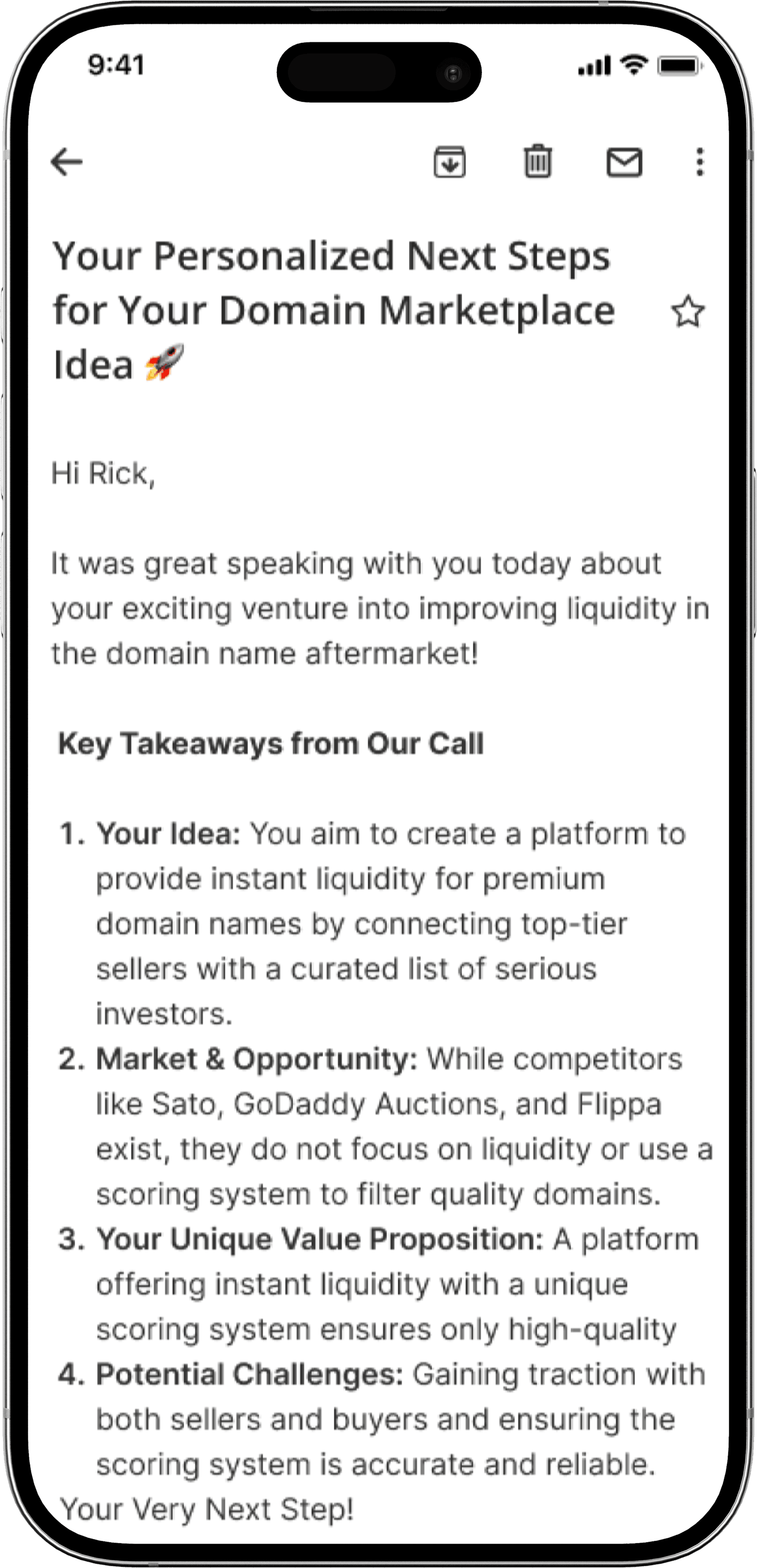Your Recent Startup Scores
Startup Trends & Insights Report
You want idea exploration -- not generic advice. Val understands your market, helps refine your value proposition, sends you assets and delivers momentum.
| Feature | Val (ValidatorAI) | Traditional Mentor Sites |
|---|---|---|
| Affordable ($49 for 3 calls) | ✅ | ❌ ($100–$500+ per 30 mins.) |
| Available instantly, 24/7 | ✅ | ❌ (limited mentor availability) |
| No scheduling or waiting | ✅ | ❌ |
| Tailored advice based on your idea and market research | ✅ | ❌ (generic advice) |
| Live market, customer, and competition analysis | ✅ | ❌ |
| Full follow-up email with personalized next steps | ✅ | ❌ |
| Full transcript + top 5 takeaways | ✅ | ❌ |
| Launch-ready landing page built during session | ✅ | ❌ |
| Business analysis report included | ✅ | ❌ |
| 14-step launch roadmap provided | ✅ | ❌ |
| Instant first asset (landing page + action plan) | ✅ | ❌ |
| True idea exploration and ideation | ✅ | ❌ |
| Clear momentum after call | ✅ | ❌ |
| Opportunity to showcase progress to 200,000+ entrepreneurs | ✅ | ❌ |
How Do I Launch a Startup?
We all want to know if our business ides is worth purusing, and how to get it moving. Val helps you figure it out in just a few minutes. Val is trained on real market data and startup launch patterns. She’ll perform AI based competitive analysis, customer analysis and she will find your unique value proposition. You’ll get clarity, personalized feedback, and suggestions to make your idea more “market ready.” Val even gives you assets to move forward - if you want to launch. It’s fast, focused, and free.
Market Analysis with AI
Val is the startup advisor we all wish we had at the beginning: fast, honest, and grounded in real market data. While you chat, Val researches your space in real time: identifying competitors, your customer profile, and how your idea fits into the market. Then she gives you a clear value proposition to consider, and useful assets like next steps, launch advice, and helpful tools… all personalized to your idea.
Join 200,000+ startup explorers!
All 200,000 members are part of our startup newsletter: the world’s largest group of people exploring ideas, testing what’s possible, and thinking about what to build next. Each week, we share insights from Val, startup trends, and real conversations about business and life at the earliest stages. You can even share your idea with the group if you want feedback or early traction. No pressure, just exploration.
Simulate Customer Discussions and a Launch
Val will run a quick simulation of what your startup launch might look like. She will surface potential concerns, objections and feedback from your target customer. Our AI tool will identify phrases on Google you can rank for, what smart pricing might look like and what your website conversion rate could be.
Expert Advice
Expert Advice From Top Entrepreneurs
Expert interview series: Hubspot Co-founder Dharmesh Shah
Expert interview series: NYT Bestselling Author Diana Kander
Expert interview series: He Built and Sold a Unicorn with Jacques Fu
Expert Interview series: He Built Liquid Death and Dollar Shave Club with VC Mike Jones
Expert interview series: Investor and VC Carey Ransom
Expert interview series: Startup Studio Founder Dawn Haynes Shares the Gameplan
Expert interview series: $13million Raised with Bold Metrics Founder Morgan Linton
Testimonials
What People Are Saying
Our entrepreneurs are blown away by our AI tool's ability to assess their opportunity and provide actionable advice and feedback. Hundreds of people are loving their AI startup mentor.
Hundreds of happy entrepreneurs
4.8/5
Articles
Our Latest Articles on Validating Startup Ideas
🚀 The 3 Questions that Spark Every Great Startup Idea.
💡 Our Idea Generator Turns Your Answers into Opportunity. It's FREE!
😲 You Won't Believe HOW MUCH MONEY This Simple Website is Making!
🚀 Plus: Get 100 Epic AI Prompts in This FREE Report.
😟 Still sitting on your startup idea? I can get you UNSTUCK right now!
🤑 Plus: 200 ways to make income using AI! Free Report.
Startup Validation Help
FAQ and Quick Startup Advice
Curious what an MVP Is? Do you want to know how to find product market fit? Here are quick answers to common questions that our AI sees
Have questions about startups and idea validation?
Email us using the form below and we'll get in touch with you ASAP.


































